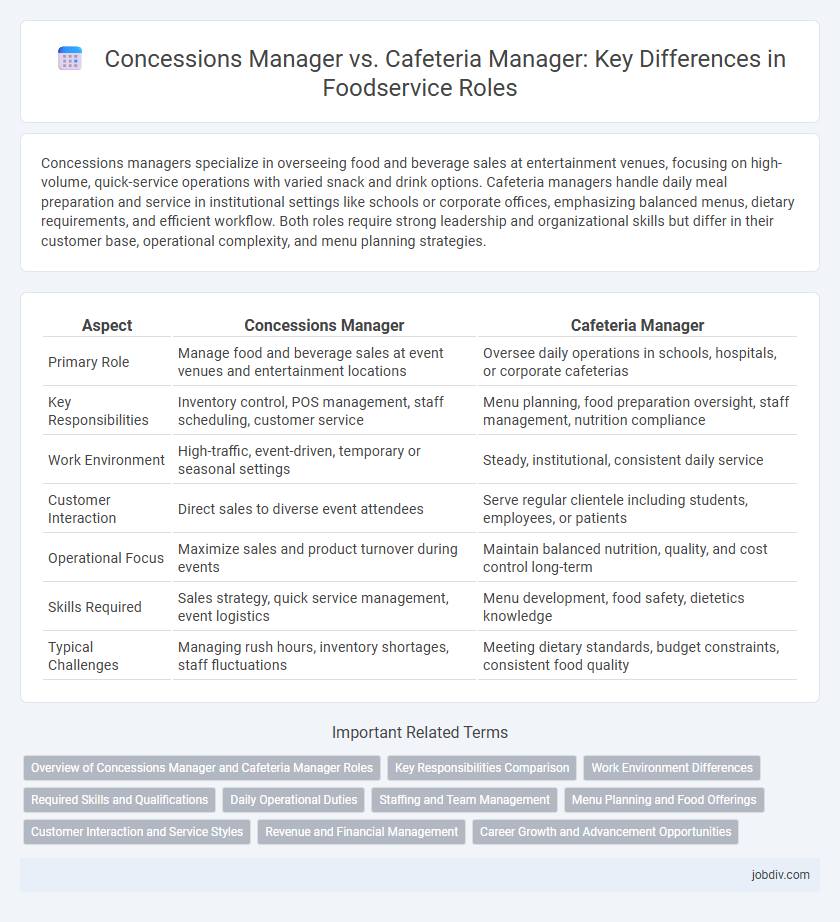Concessions managers specialize in overseeing food and beverage sales at entertainment venues, focusing on high-volume, quick-service operations with varied snack and drink options. Cafeteria managers handle daily meal preparation and service in institutional settings like schools or corporate offices, emphasizing balanced menus, dietary requirements, and efficient workflow. Both roles require strong leadership and organizational skills but differ in their customer base, operational complexity, and menu planning strategies.
Table of Comparison
| Aspect | Concessions Manager | Cafeteria Manager |
|---|---|---|
| Primary Role | Manage food and beverage sales at event venues and entertainment locations | Oversee daily operations in schools, hospitals, or corporate cafeterias |
| Key Responsibilities | Inventory control, POS management, staff scheduling, customer service | Menu planning, food preparation oversight, staff management, nutrition compliance |
| Work Environment | High-traffic, event-driven, temporary or seasonal settings | Steady, institutional, consistent daily service |
| Customer Interaction | Direct sales to diverse event attendees | Serve regular clientele including students, employees, or patients |
| Operational Focus | Maximize sales and product turnover during events | Maintain balanced nutrition, quality, and cost control long-term |
| Skills Required | Sales strategy, quick service management, event logistics | Menu development, food safety, dietetics knowledge |
| Typical Challenges | Managing rush hours, inventory shortages, staff fluctuations | Meeting dietary standards, budget constraints, consistent food quality |
Overview of Concessions Manager and Cafeteria Manager Roles
Concessions Managers oversee operations at venues like stadiums and theaters, managing food and beverage sales, inventory control, and staff scheduling to maximize customer satisfaction and profit. Cafeteria Managers are responsible for planning menus, supervising kitchen staff, maintaining food safety standards, and ensuring efficient service in institutional settings such as schools, hospitals, and corporate cafeterias. Both roles require strong leadership, budgeting skills, and knowledge of foodservice regulations but differ in environment and operational focus.
Key Responsibilities Comparison
Concessions Managers oversee the sales and inventory of food and beverages at venues such as stadiums, emphasizing customer service during events and managing temporary staff. Cafeteria Managers are responsible for daily operations of institutional dining facilities, including menu planning, food safety compliance, and staff scheduling. Both roles require budget management and vendor coordination, but Concessions Managers focus on high-traffic, event-based service while Cafeteria Managers ensure consistent meal quality and nutrition standards.
Work Environment Differences
Concessions Managers primarily work in dynamic, event-driven environments such as stadiums, theaters, and arenas, requiring swift service during peak times and crowd management skills. Cafeteria Managers operate in more predictable, often institutional settings like schools, hospitals, or corporate facilities, focusing on consistent meal production and adherence to dietary guidelines. The concessions role demands flexibility for irregular hours and event schedules, while cafeteria management involves regular hours aligned with daily meal service routines.
Required Skills and Qualifications
Concessions Managers require strong customer service skills, inventory management expertise, and the ability to handle high-volume sales efficiently, often needing experience in quick-service food operations. Cafeteria Managers must possess skills in menu planning, nutritional knowledge, staff supervision, and compliance with health regulations, typically requiring background in food safety certification and management experience in institutional or corporate dining settings. Both roles demand effective communication, leadership, and budgeting capabilities to ensure smooth foodservice operations and customer satisfaction.
Daily Operational Duties
Concessions Managers oversee daily operations in venues such as stadiums or theaters, managing inventory, coordinating staff shifts, and ensuring timely service during high-traffic events. Cafeteria Managers focus on meal planning, food preparation schedules, maintaining health and safety standards, and optimizing workflow in educational or corporate dining facilities. Both roles require effective team leadership and resource management but differ in environment and volume-driven demands.
Staffing and Team Management
Concessions Managers prioritize fast-paced, high-turnover staffing to handle peak event times efficiently, often managing temporary or part-time workers. Cafeteria Managers focus on stable, consistent team scheduling to maintain daily operations, emphasizing employee training and retention. Both roles require strong leadership skills but differ in workforce structure and scheduling demands.
Menu Planning and Food Offerings
A Concessions Manager typically focuses on quick-service, high-turnover food offerings tailored for events and venues, emphasizing snack-oriented menu planning with items like popcorn, nachos, and beverages that cater to large crowds. In contrast, a Cafeteria Manager designs diverse and balanced menus suitable for daily dining in schools, hospitals, or corporate settings, prioritizing nutritional value and variety for regular meal service. Both roles require expertise in inventory management and cost control, but menu planning for concessions leans towards convenience and speed, while cafeterias emphasize comprehensive meal options and dietary considerations.
Customer Interaction and Service Styles
Concessions Managers oversee fast-paced service environments like sports arenas, emphasizing quick customer interactions and efficient order fulfillment to handle large crowds. Cafeteria Managers focus on a more relaxed, casual service style, facilitating personalized customer engagement and maintaining steady service flow during meal periods. Both roles require strong communication skills, but concessions prioritize speed and volume, while cafeterias emphasize consistency and customer satisfaction.
Revenue and Financial Management
Concessions Managers typically oversee high-volume sales at events, focusing on dynamic pricing strategies and real-time inventory controls to maximize revenue during peak times. Cafeteria Managers emphasize steady financial management through budget adherence, cost control in food procurement, and optimizing meal pricing to ensure consistent profitability. Both roles require expertise in forecasting demand and managing labor costs to drive overall financial performance in their respective foodservice environments.
Career Growth and Advancement Opportunities
Concessions managers often have opportunities to advance into regional or corporate roles due to their experience managing high-volume, event-based sales, while cafeteria managers typically progress within educational or healthcare institutions, focusing on operational efficiency and nutrition standards. Skills in staff coordination, inventory management, and customer service in both roles are highly transferable, but concessions managers may advance faster into marketing and vendor relations. Career growth for cafeteria managers includes moving into director-level positions overseeing multiple facilities or foodservice programs.
Concessions Manager vs Cafeteria Manager Infographic

 jobdiv.com
jobdiv.com